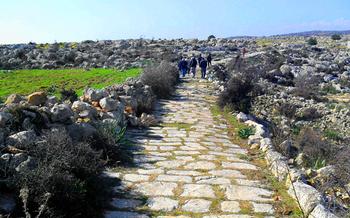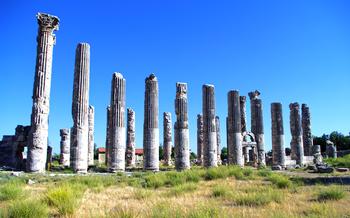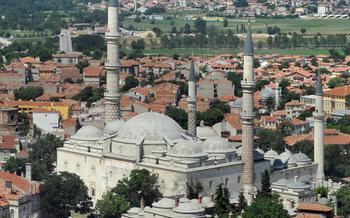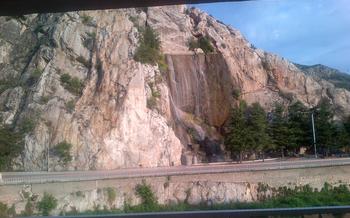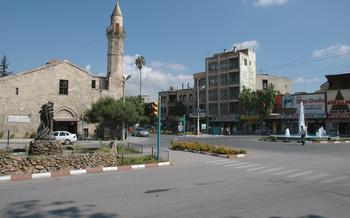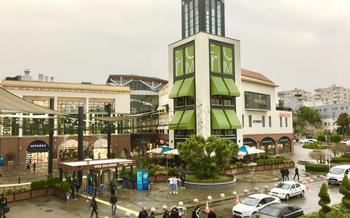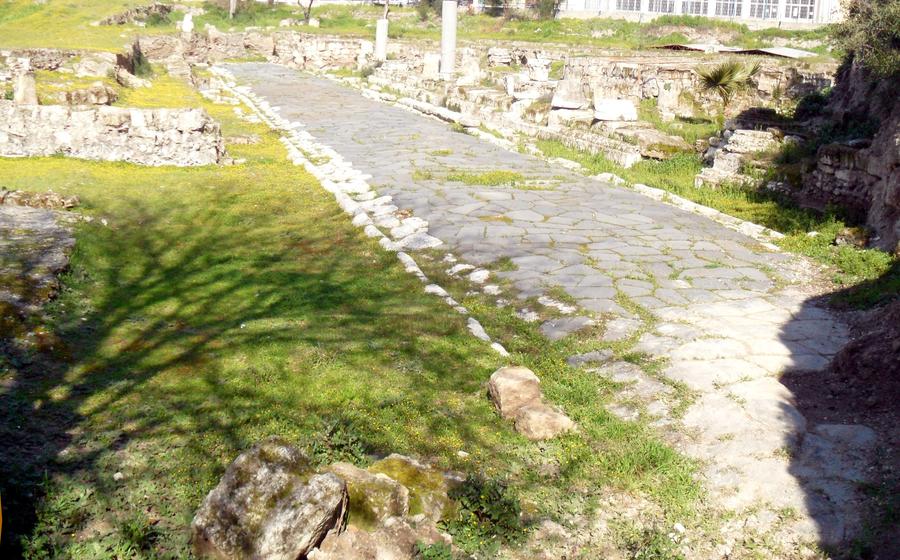
Ancient Road of Tarsus
- The Ruins of Tarsus: A Journey Through History
- Unveiling the Roman Theater
- Discovering the Tarsus Citadel
- Walking the Historic Streets
- Visiting the Tarsus Museum
- Unveiling the Cleopatra's Gate
- Exploring the St. Paul's Church
- History and Religious Significance
- Architectural Style and Features
- Ongoing Restoration Projects
- Visiting Hours and Pilgrimage Site
- Discovering the Tarsus Waterfall
- Experiencing the Local Cuisine
- Celebrating the Mersin International Music Festival
- Unveiling the Soli-Pompeiopolis Ancient City
- Exploring the Kizkalesi Castle
- Discovering the Mersin Yacht Marina
- Insider Tip: Unveiling the Hidden Gems of Mersin
The Ruins of Tarsus: A Journey Through History
In the heart of Mersin, the ancient city of Tarsus stands as a testament to a rich and storied past. Founded in the 2nd millennium BCE, Tarsus flourished as a major center of trade and culture, leaving behind a legacy of remarkable ruins that invite exploration.
The ruins of Tarsus offer a glimpse into the city's illustrious history. Walk through the remnants of ancient walls, marvel at the intricate carvings adorning temple facades, and uncover the secrets hidden beneath the earth in ongoing excavations. The architectural highlights of Tarsus include the well-preserved Roman Theater, the imposing Tarsus Citadel, the sacred Tarsus Grand Mosque, and the enigmatic Cleopatra's Gate.
Excavation and restoration efforts have breathed new life into the ruins of Tarsus, revealing the city's grandeur and shedding light on its past. Discover the stories etched in stone, piece together the puzzle of ancient civilizations, and witness the rebirth of a city that once stood as a beacon of knowledge and prosperity.
Access to the ruins of Tarsus is convenient, with well-maintained roads leading to the site. Admission fees are nominal, ensuring that this historical treasure is accessible to all. Immerse yourself in the ancient world and let the ruins of Tarsus transport you back in time.
Unveiling the Roman Theater
The Roman Theater of Tarsus, a majestic relic of ancient architectural prowess, stands as a testament to the city's rich history and cultural heritage. Built during the Roman Empire's reign, this impressive structure once hosted theatrical performances, gladiatorial contests, and public gatherings that captivated audiences.
With its intricate design and well-preserved features, the theater showcases the engineering prowess of the Roman era. Its expansive seating area, adorned with intricate carvings and decorative elements, offers a glimpse into the grandeur of past spectacles. The stage, adorned with elaborate backdrops and props, served as a platform for artistic expression and entertainment.
Ongoing excavations at the site continue to unveil hidden treasures and shed light on the theater's past. Archaeologists have uncovered artifacts, inscriptions, and remnants of stage machinery, providing valuable insights into the theater's operation and significance.
Today, the Roman Theater of Tarsus serves as a vibrant venue for cultural events, concerts, and performances. Its historical charm, combined with modern amenities and acoustics, creates a unique atmosphere that transports visitors back in time. Whether attending a live performance or simply marveling at its architectural beauty, the Roman Theater remains an iconic landmark that encapsulates Tarsus's cultural essence.
Discovering the Tarsus Citadel
The Tarsus Citadel, a majestic fortress that has stood the test of time, holds a prominent place in the city's rich history. Its formidable walls, once a testament to the city's resilience, now stand as a testament to its enduring legacy.
Erected in the 6th century AD by the Byzantine emperor Justinian I, the citadel served as a strategic stronghold, protecting Tarsus from invaders and securing its position as a vital trade hub. Its thick, imposing walls, adorned with towers and battlements, showcased the city's military prowess and architectural ingenuity.
Over the centuries, the citadel underwent various modifications and additions, reflecting the changing rulers and influences that shaped Tarsus. From the Byzantines to the Seljuks and finally the Ottomans, each era left its mark on this architectural masterpiece.
Today, the Tarsus Citadel stands as a testament to the city's enduring spirit. Although the ravages of time and conflicts have taken their toll, restoration projects are underway to preserve and restore this iconic landmark to its former glory.
As you explore the citadel, let your imagination transport you back in time, when fierce battles were fought and brave warriors defended their homeland. Climb the ancient steps, marvel at the intricate carvings, and soak in the breathtaking panoramic views that stretch across the city and beyond. The Tarsus Citadel, with its rich history and imposing presence, is a must-visit for anyone seeking to delve into the heart of Tarsus's storied past.
Walking the Historic Streets
Strolling through the historic streets of Tarsus is like embarking on a journey through time, where the past and present seamlessly blend. Admire the well-preserved Ottoman-era houses, with their intricate carvings and colorful facades, which line the narrow cobblestone alleys. Discover hidden courtyards adorned with vibrant flowers and the gentle sound of trickling fountains.
Explore the traditional markets, where vendors display an array of fresh produce, aromatic spices, and handcrafted souvenirs. Engage with the friendly locals who are eager to share stories about their city's rich history and cultural heritage. Indulge in the culinary delights that Tarsus is renowned for, sampling mouthwatering kebabs, gözleme (stuffed flatbread), and künefe (shredded pastry with cheese and syrup).
As you wander through the historic streets, let the spirit of Tarsus captivate you. Feel the warmth of the sun on your skin, the gentle breeze rustling through the trees, and the harmonious blend of sounds that create the unique symphony of this ancient city.
Visiting the Tarsus Museum
Enrich your understanding of Tarsus's rich history and cultural heritage by visiting the Tarsus Museum. This treasure trove of archaeological artifacts and exhibits offers a captivating journey through the city's past.
Marvel at an array of ancient relics, including pottery, sculptures, coins, and inscriptions, each telling a unique story of Tarsus's diverse civilizations. Explore the historical timeline of the city, from its humble beginnings to its rise as a prominent center of trade and culture.
Engage with interactive displays and educational programs that bring the past to life. Learn about the daily lives, customs, and beliefs of the people who once called Tarsus home. Discover the intricate connections between Tarsus and other ancient civilizations, such as the Hittites, Romans, and Byzantines.
Admission fees are nominal, and the museum operates during regular hours, providing ample opportunity for visitors to immerse themselves in the fascinating world of Tarsus's history.
Unveiling the Cleopatra's Gate
Historical Significance and Legends
Cleopatra's Gate stands as a testament to ancient history and legendary tales. According to local lore, the gate was built in honor of the renowned Egyptian queen, Cleopatra VII, during her visit to Tarsus with her Roman lover, Mark Antony. It is said that the gate served as a grand entrance for the queen's procession, symbolizing her power and influence in the region.
Architectural Features and Construction
The gate is an impressive sight, showcasing remarkable architectural prowess. Constructed from massive blocks of stone, it features a grand arched entrance flanked by two imposing towers. The towers, adorned with intricate carvings and decorative elements, add to the gate's grandeur. The gate's sturdy construction has withstood the test of time, preserving its majesty amidst the changing landscapes of Tarsus.
Connection to Ancient Trade Routes
Cleopatra's Gate held strategic importance as a gateway to ancient trade routes. Tarsus, situated at the crossroads of major trade routes, flourished as a commercial hub. The gate served as a vital entry point for goods and travelers from distant lands, contributing to the city's economic prosperity and cultural exchange.
Current State and Preservation Efforts
While Cleopatra's Gate has undergone significant wear and tear over the centuries, it remains a well-preserved relic of the past. Restoration efforts have been undertaken to safeguard its historical integrity, ensuring its continued existence as a symbol of Tarsus' rich heritage. Today, the gate stands as a popular tourist attraction, drawing visitors who seek to immerse themselves in the ancient world.
Exploring the St. Paul's Church
At the heart of Tarsus, nestled amidst historical streets, stands the revered St. Paul's Church, a testament to religious devotion and architectural splendor. Believed to be the birthplace of the apostle Paul, this sacred site holds immense significance for Christians and pilgrims worldwide.
History and Religious Significance
St. Paul's Church, also known as the Church of St. Paul, traces its roots back to the early days of Christianity. According to tradition, the apostle Paul was born in Tarsus, and it is believed that he may have visited or even preached within the church's walls. This rich history has transformed the church into a pilgrimage site, attracting devout visitors from around the globe.
Architectural Style and Features
The church's architectural style showcases a harmonious blend of Byzantine and Gothic influences. Its imposing stone facade, adorned with intricate carvings and decorative elements, reflects the grandeur of its past. Inside, visitors are captivated by the soaring arches, elegant columns, and beautiful stained-glass windows that illuminate the sacred space with a warm, ethereal glow.
Ongoing Restoration Projects
Despite its historical significance, the church has undergone the ravages of time and natural disasters. Recognizing its importance, ongoing restoration projects are meticulously underway to preserve and restore the church's original beauty. These efforts aim to safeguard this architectural treasure for future generations while maintaining its spiritual essence.
Visiting Hours and Pilgrimage Site
St. Paul's Church is open to visitors throughout the year, welcoming pilgrims and tourists alike. Visitors can explore the church's interior, marvel at its architectural wonders, and immerse themselves in its serene atmosphere. Guided tours are available, providing insights into the church's history, religious significance, and ongoing restoration efforts.
Whether for religious pilgrimage or historical exploration, St. Paul's Church in Tarsus stands as a beacon of faith, architectural beauty, and cultural heritage, inviting visitors to delve into its sacred spaces and discover the profound impact it has had on Christianity and the city of Tarsus.
Discovering the Tarsus Waterfall
Amidst the bustling city of Tarsus, nature unveils a hidden gem – the Tarsus Waterfall. Nestled within a verdant oasis, this cascading wonder offers a tranquil escape from the urban hum. The waterfall's mesmerizing plunge, surrounded by lush greenery and rocky formations, creates a symphony of sights and sounds that soothe the soul.
Hiking enthusiasts can embark on scenic trails that lead to the waterfall, immersing themselves in the breathtaking panoramas of the surrounding landscape. The path winds through verdant groves, revealing glimpses of the cascading waters as they approach. Along the way, visitors can spot native flora and fauna, adding to the immersive experience.
At the base of the waterfall, a tranquil pool invites visitors to take a refreshing dip or simply bask in the tranquility of the surroundings. The mist from the cascading waters creates a refreshing ambiance, while the gentle roar of the waterfall provides a soothing backdrop for relaxation.
For those seeking a more active experience, the Tarsus Waterfall offers opportunities for picnics and recreational activities. Designated spots are available for families and groups to spread out their blankets, enjoy a leisurely meal, and soak in the natural beauty. Visitors can also indulge in fishing, with the waterfall's pristine waters teeming with a variety of species.
Reaching the Tarsus Waterfall is a breeze, with convenient transportation options available. Regular buses and taxis depart from the city center, making it easily accessible for both locals and tourists. Once there, visitors can explore the area at their own pace, immersing themselves in the tranquility and natural wonders that the waterfall offers.
Experiencing the Local Cuisine
Mersin's culinary scene is a delightful blend of Turkish flavors and Mediterranean influences, offering a tantalizing array of dishes to satisfy every palate. Indulge in the aromatic delights of tantuni, a local specialty made with grilled meat, vegetables, and spices, wrapped in a soft, warm tortilla. Savor the freshness of mevlana pide, a boat-shaped flatbread topped with cheese, tomatoes, and herbs, baked to perfection. For a taste of the sea, try balık ekmek, a simple yet delicious sandwich featuring grilled fish, onions, and salad, wrapped in a crusty bread.
Explore the vibrant local markets and street food stalls, where vendors showcase their culinary creations. Sample freshly caught seafood, grilled to perfection and served with a squeeze of lemon. Treat your sweet tooth to lokum, a traditional Turkish delight made with sugar, starch, and flavored with various fruits, nuts, or spices. Experience the warmth of Turkish coffee, prepared using a unique method that results in a strong, aromatic brew.
Venture into the city's renowned restaurants to savor authentic Mersin cuisine in a more refined setting. Indulge in meze platters, an assortment of small dishes featuring various appetizers, dips, and salads. Try işkembe çorbası, a hearty lamb tripe soup, or şalgam suyu, a refreshing fermented turnip juice.
For a deeper dive into the local gastronomy, participate in cooking classes or culinary workshops, where you can learn the secrets of preparing traditional Mersin dishes. Discover the art of rolling yaprak sarma, stuffed vine leaves, or master the technique of grilling the perfect köfte, seasoned meatballs.
Whether you prefer street food delights or fine dining experiences, Mersin's culinary scene offers something for every taste. Embrace the flavors, aromas, and traditions that make Mersin's cuisine a true feast for the senses.
Celebrating the Mersin International Music Festival
At the heart of Mersin's cultural tapestry lies the Mersin International Music Festival, a grand celebration of diverse musical expressions from around the globe. This vibrant festival has cemented its place as a premier cultural event, attracting music enthusiasts from far and wide.
Since its inception, the festival has showcased a captivating array of musical genres, ranging from classical symphonies to mesmerizing ethnic melodies, captivating jazz improvisations, and foot-tapping contemporary beats. Renowned musicians, orchestras, and ensembles grace the festival's stages, delivering unforgettable performances that leave audiences spellbound.
Immerse yourself in the electric atmosphere as the city transforms into a symphony of sound. Multiple venues across Mersin play host to the festival's enchanting performances, including the Mersin Amphitheater, the Mersin Culture and Convention Center, and various outdoor stages.
Mersin International Music Festival is not merely a celebration of music; it's a vibrant tapestry of cultural exchange and global harmony. It's an opportunity to connect with fellow music lovers, discover new genres, and forge unforgettable memories.
Insider Tip: To fully embrace the festival experience, venture beyond the main stage and explore the fringe events and workshops that often accompany the festival. These intimate gatherings offer a chance to engage with musicians, learn about different musical traditions, and experience the infectious energy of the local music scene.
Unveiling the Soli-Pompeiopolis Ancient City
Historical Context and Archaeological Excavations:
Nestled on the Mediterranean coast, the ancient city of Soli-Pompeiopolis holds a significant place in the annals of history. Founded by Greek colonists in the 6th century BC, it flourished as a prominent maritime and commercial center. In 64 BC, the city fell under Roman rule and was renamed Pompeiopolis in honor of Pompey the Great. Archaeological excavations have unearthed an array of well-preserved ruins, including temples, theaters, baths, and a necropolis, offering a glimpse into the city's rich past.
Well-Preserved Ruins and Architectural Highlights:
One of the most striking features of Soli-Pompeiopolis is its remarkably preserved ruins. The city walls, constructed using massive stone blocks, still stand tall, providing a testament to the engineering prowess of its ancient builders. Within the walls, visitors can explore the remains of a grand theater, capable of accommodating thousands of spectators. The well-preserved mosaics, depicting scenes from mythology and everyday life, offer a glimpse into the artistic traditions of Soli-Pompeiopolis.
Mosaics, Amphitheater, and City Walls:
The city's most renowned attraction is undoubtedly its collection of stunning mosaics. These intricate artworks, crafted using colorful tesserae, adorn the floors of many of the city's buildings. The mosaics depict a wide range of subjects, from mythological scenes to hunting expeditions, providing a glimpse into the beliefs and pastimes of Soli-Pompeiopolis's inhabitants. The amphitheater, with its well-preserved stage and seating tiers, offers a glimpse into the city's vibrant entertainment scene.
Accessibility and Admission Information:
Soli-Pompeiopolis is located approximately 15 kilometers west of Mersin, making it easily accessible by car or public transportation. The site is open to visitors daily, and the admission fee is minimal. Guided tours are available, providing visitors with a deeper understanding of the city's history and significance.
Exploring the Kizkalesi Castle
At the heart of Mersin, Kizkalesi Castle stands as a testament to the region's rich history and intriguing legends. Perched on a small islet just off the coast, this medieval fortress has captured the imagination of travelers and locals alike.
Step back in time as you approach the castle by boat, admiring its imposing walls and towers that have stood guard for centuries. Legend has it that the castle was built by a king to protect his daughter from a prophecy foretelling her death by a snakebite. Isolated on the islet, the princess was safe from all harm—except for a venomous snake that was brought to her by a bird.
Explore the castle's well-preserved ruins, wandering through its chambers and courtyards while imagining the lives of those who once inhabited this strategic stronghold. Admire the intricate carvings and architectural details that adorn the castle's walls, hinting at the skilled craftsmanship of its builders.
Climb to the castle's highest point to be rewarded with breathtaking panoramic views of the surrounding landscape. Gaze out over the sparkling Mediterranean Sea, the lush green Taurus Mountains, and the bustling city of Mersin in the distance.
Kizkalesi Castle is easily accessible by boat tours departing from the Mersin Yacht Marina or the nearby town of Tasucu. Whether you're a history buff, a lover of legends, or simply seeking a unique and scenic experience, a visit to this iconic castle is a must when exploring Mersin.
Discovering the Mersin Yacht Marina
At the heart of Mersin's vibrant coastal landscape lies the Mersin Yacht Marina, a world-class facility that welcomes seafaring enthusiasts and leisure seekers alike.
- Unparalleled Facilities and Amenities:
The marina boasts state-of-the-art infrastructure, providing a safe and secure haven for yachts of all sizes. With a capacity of over 600 berths, it offers a range of services, including power supply, water connections, and waste disposal facilities.
- Yachting Activities and Water Sports:
The marina serves as a hub for yachting enthusiasts, offering a variety of water sports and activities. From sailing and motorboating to jet skiing and windsurfing, there's something for every adrenaline junkie.
- Scenic Views and Coastal Attractions:
The marina's location along Mersin's picturesque coastline provides breathtaking views of the Mediterranean Sea and the surrounding Taurus Mountains. Visitors can enjoy leisurely strolls along the promenade, admiring the panoramic vistas and the vibrant atmosphere.
- Sailing Excursions and Boat Rentals:
For those seeking a more immersive experience, the marina offers sailing excursions and boat rentals. Explore hidden coves, secluded beaches, and nearby islands, discovering the pristine beauty of the Turkish Riviera.
Insider Tip: Unveiling the Hidden Gems of Mersin
Beyond the popular attractions, Mersin offers a treasure trove of hidden gems waiting to be discovered. Explore the charming neighborhood of Mezitli, known for its traditional Turkish houses and vibrant street art. Immerse yourself in the flavors of local cuisine at the bustling Yenişehir Market, where you can sample fresh produce, spices, and delectable street food.
Venture off the beaten path to discover the scenic coastal town of Erdemli, with its picturesque beaches, ancient ruins, and idyllic atmosphere. Don't miss the opportunity to visit the enchanting village of Narlıkuyu, nestled amidst lush citrus groves and offering breathtaking views of the Mediterranean Sea.
For a unique cultural experience, attend a traditional Turkish coffee ceremony or join a local cooking class to learn the secrets of Mersin's delicious cuisine. Immerse yourself in the vibrant atmosphere of a local festival or celebration, where you can witness traditional dances, music, and performances that showcase the rich cultural heritage of the region.
To fully embrace the local way of life, engage with the friendly and welcoming people of Mersin. Strike up conversations, learn a few Turkish phrases, and embrace the spirit of hospitality that defines this vibrant city. Mersin is a place where hidden gems are waiting to be uncovered, and where authentic experiences await those who venture beyond the surface.
